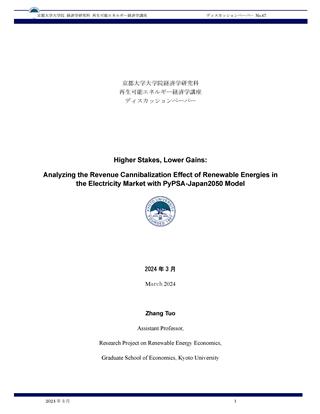TOP > ディスカッションペーパー > No.67 Higher Stakes, Lower Gains: Analyzing the Revenue Cannibalization Effect of Renewable Energies in the Electricity Market with PyPSA-Japan2050 Model
No.67 Higher Stakes, Lower Gains: Analyzing the Revenue Cannibalization Effect of Renewable Energies in the Electricity Market with PyPSA-Japan2050 Model
March 2024
Tuo ZHANG
Assistant Professor, Research Project on Renewable Energy Economics, Graduate School of Economics, Kyoto University
 Previous research has highlighted the challenge of integrating renewable energies into electricity markets, particularly in maintaining market value amidst the increasing penetration. This paper builds on this foundation, exploring how renewable energies can be effectively promoted as a primary power source in Japan's electricity market post-grid parity. It delves into the trend of declining market value for renewables with increased market shares, influenced by their intermittency and non-dispatchability. With renewables reaching grid parity, the study, using the PyPSA-Japan-2050 Model, confirms the revenue cannibalization effect in Japan's solar, offshore, and onshore wind sectors, noting market value declines as penetration grows. We propose that enhanced carbon pricing policies could mitigate this decline, offering new strategies for sustainable energy development. We also consider the role of demand response mechanisms, such as electric vehicle batteries, in enhancing market value and stabilizing energy prices.
Previous research has highlighted the challenge of integrating renewable energies into electricity markets, particularly in maintaining market value amidst the increasing penetration. This paper builds on this foundation, exploring how renewable energies can be effectively promoted as a primary power source in Japan's electricity market post-grid parity. It delves into the trend of declining market value for renewables with increased market shares, influenced by their intermittency and non-dispatchability. With renewables reaching grid parity, the study, using the PyPSA-Japan-2050 Model, confirms the revenue cannibalization effect in Japan's solar, offshore, and onshore wind sectors, noting market value declines as penetration grows. We propose that enhanced carbon pricing policies could mitigate this decline, offering new strategies for sustainable energy development. We also consider the role of demand response mechanisms, such as electric vehicle batteries, in enhancing market value and stabilizing energy prices.
Keywords:Renewable Energy Integration, Market Value Dynamics, PyPSA-Japan-2050 Model, Carbon Pricing Policy, Demand Response Mechanisms

